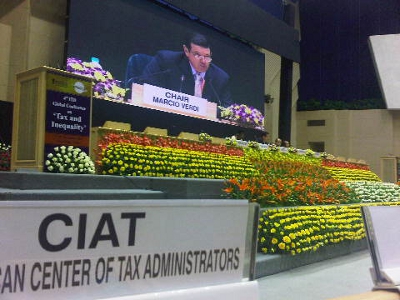CIAT Participates in the 4th Global Conference of the International Tax Dialogue (ITD) ‘Tax and Inequality’
New Delhi, India, 7 – 9 December 2011.
Addressing growing inequalities is now at the centre of the political debate and all countries are taking different actions to address it. Increasing inequality reaches far beyond economic implications, raising a number of political and ethical questions which have wide-ranging consequences for the future of all societies.
Globalisation and the sustainable growth path of many economies in transition and developed countries have produced impressive results in terms of economic growth, social development and poverty reduction. However, the benefits of stronger growth have not always been shared equally and income inequality has remained at very high levels. Achieving greater equality as a key to social cohesion remains a priority for every society.
Against this background, this conference discussed the role of taxation in reducing inequalities in income and wealth. The conference tried to identify which policies have failed and which could play a greater role in reducing inequalities in the future.
More than 400 senior tax policymakers and administrators from almost 90 countries participated at this event hosted by the Finance Ministry of India and organized by the International Tax Dialogue (ITD). The ITD is a joint initiative of various organisations working on tax issues – the IMF, the OECD, the World Bank, the European Commission, the IADB, and CIAT. The global conferences of the ITD have established a reputation of providing a unique opportunity for those engaged in making decisions about tax to discuss global issues.
In his closing remarks, Rintaro Tamaki, Deputy Secretary General of the OECD, said “As I travel around the world, a question that I get repeatedly asked is how can we deal with inequalities? What will be the impact of the crisis? How do we reconcile the fact that the behavior of banks was one of the major causes of crisis yet despite public bailouts, we see them continue to pay millions of dollars in bonuses? How can we show our citizens that the gains and the benefits of globalization are being fairly shared?
Politicians need to have good answers to these questions, and they need to have answers quickly, otherwise we risk a back lash against globalization as countries move back towards protectionism.
This conference has shown that “smart” tax policy can reconcile the need to promote sustainable growth with the need to reduce excessive inequalities, particularly at the top end of the income scale.
The ITD recognises that in order to have a real impact on what happens in your countries, there needs to follow up. This is why we are organizing a series of regional meetings in Asia, in Latin America, in the MENA region and in Africa. We will make a renewed effort to identify what has worked and what has not worked in using tax policy to reduce inequalities.”
In his closing remarks, Mr. R S Gujral, Finance and Revenue Secretary of India, noted that “Many issues were raised in the last two and a half days on how tax can help in reducing inequalities. Participants recognise there is no silver bullet. The solutions need to be adapted to the state of economic development and demographics. Only after taking into account these different factors can the appropriate tax policy response to growing inequalities be addressed.”
During a comprehensive two and a half day programme, conference participants addressed the tax issues raised by economic developments and globalisation that have affected the distribution of income, wealth, and living standards within and between countries over recent years. Income inequality between countries has diminished significantly as economic reform in many emerging economies has spurred growth, significantly reducing levels of absolute poverty globally. However, recent decades have also seen significant changes in the distribution of both wealth and incomes within countries, with notable increases in the share of income enjoyed by those at the very top of the income distribution in many countries. A rising tide has not lifted all boats.
The structural linkages between growth and inequality raise difficult issues about how best to raise taxes in a way which contributes to both growth and equitable development. The financial crisis has further impacted on the underlying trends affecting poverty and inequality globally. Sharp rises in unemployment – and therefore significant losses of income for individuals – in many countries are likely to take a long time to be reversed. The fiscal pressures to increase revenues and need to reduce debt levels in many, principally developed, countries require tough decisions on how far to increase taxes and where to make cuts in public expenditures. The impact on inequality is a crucial consideration for Finance Ministers.
The ITD and its partners believe that facilitating international dialogue on tax policy and administration is important if countries are to make the right informed decisions that reflect their own unique circumstances. We are working together to provide support to countries in developing and implementing tax administration and policy reforms.
Information: Conference Agenda
ITD Global Conference‘Tax and Inequality’ Website

Mr. Márcio Verdi
CIAT Executive Secretary
